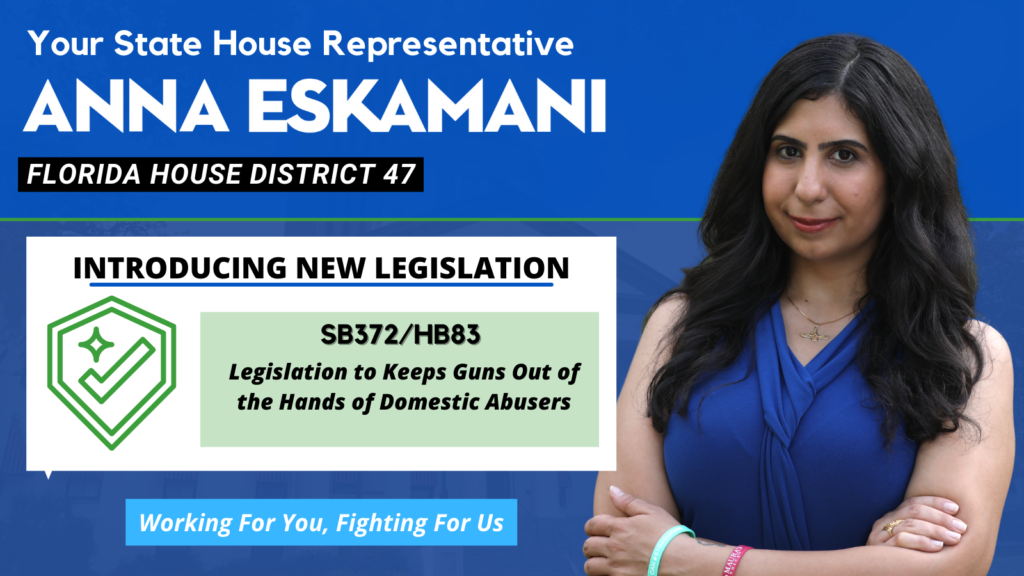The two legislators are committed to reducing gun violence in situations of domestic violence and ensuring women’s voices are heard in the gun safety debate
Orlando, FL— Senator Lori Berman (D-Delray Beach) and Representative Anna V. Eskamani (D-Orlando) have re-filed legislation that would keep guns out of the hands of domestic abusers, saving countless women and family members from becoming potential victims.
“We know that guns pose a grave and imminent threat to the safety and well-being of countless women and families,” said Senator Berman. “In more than half of mass shootings over the past decade, the perpetrator shot a current or former intimate partner or family member as part of the rampage. Insufficient and weak gun laws on both the state and federal levels are at the heart of the problem with gun violence against women in our country, and SB372/HB83 will work to strengthen these laws, keeping women and families more safe.”
As noted by The Educational Fund to Stop Gun Violence, domestic violence, including intimate partner violence, is a public health crisis in the United States. Nearly one in four women and one in seven men will experience severe physical violence at the hands of their intimate partner in their lifetime. Fortunately, most victims of domestic violence survive. But far too many do not.
According to the National Partnership for Women and Families, the United States is the most dangerous country in the developed world for gun violence against women. Women in this country are 16 times more likely to be killed with a gun than women in other high-income countries.
“Every month, an average of 52 women are shot and killed by an intimate partner. Nearly 1 million women alive today have reported being shot or shot at by intimate partners, and 4.5 million women have reported being threatened with a gun,” said Representative Eskamani. “It’s time Florida lawmakers take action to address the link between gun violence and intimate partner violence.”
Everytown, the national gun safety advocacy organization, reports that abusers with firearms are five times more likely to kill their victims. They also stated that guns further exacerbate the power and control dynamic used by abusers to inflict emotional abuse and exert coercive control over their victims.
Federal gun laws already protect women from domestic abusers by prohibiting gun possession for people convicted of a “misdemeanor crime of domestic violence” or subject to a final domestic violence restraining order, but dangerous gaps and weaknesses in the system remain at the state level. SB372/HB83 will close those gaps by requiring a person convicted of a misdemeanor offense of domestic violence to immediately surrender (upon conviction) all firearms and ammunition in his or her possession to law enforcement. It also gives more authority to law enforcement to temporarily remove firearms from a home when reporting to a scene of domestic violence.
Using F.B.I. data and other publicly available information, Everytown analyzed mass shootings in the United States that occurred from 2009 to 2017, defining a mass shooting as one in which four or more people were shot and killed, not including the shooter. The analysis concluded the following: of the 156 shootings in the mass shooting category, 54 percent were ‘related to domestic or family violence.'”
“We have seen more than one case in Florida where a mass shooter has had a history of domestic violence,” said Representative Eskamani. “The lives of Floridians — and especially women’s lives — are on the line, and we are going to keep fighting for their safety.”
While the deadly intersection of guns and intimate partner violence affects all women, it has a disproportionate impact on Black, American Indian/Alaska Native, and Hispanic women. In addition, segments of the LGBTQ community and people with disabilities are highly vulnerable to severe forms of relationship abuse, but there is alarmingly little data on the intersection of firearms and intimate partner violence among these populations because of chronic underreporting.
“The COVID-19 pandemic has exacerbated these issues. Time found that there has been increases of domestic violence in cities across America and also found that in minority communities, domestic violence rose 50 percent. If we don’t pass this legislation, more lives in Florida will be lost,” Eskamani said.
###

